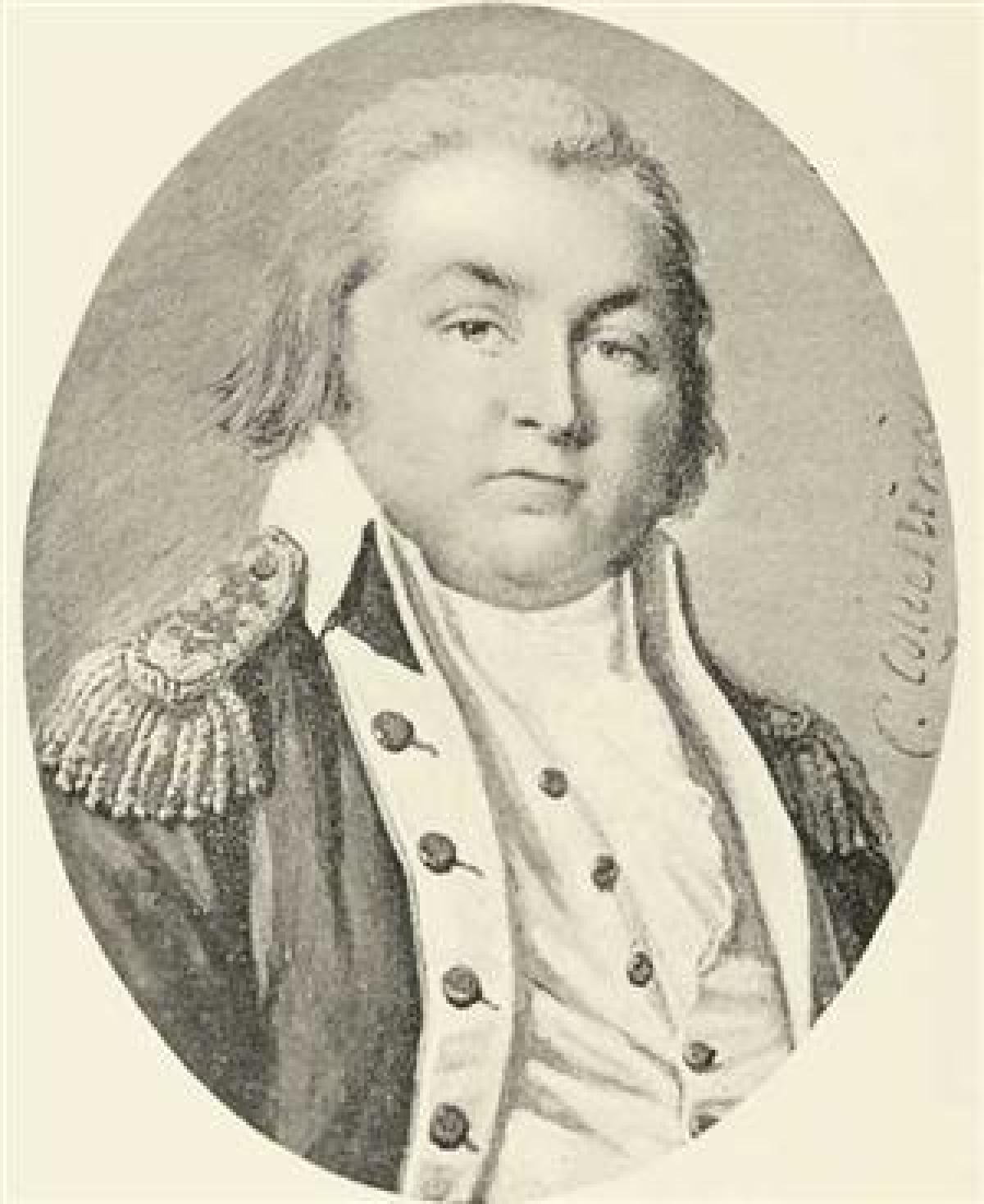James Leander Cathcart on Three Continents
At Common-place, Julie R. Voss discussed the self-fashioned career of James Leander Cathcart (1767–1843).
Cathcart was born in Ireland and, according to an autobiographical manuscript he left with his family, came to America at age eight with a relative who was a sea captain. That would have been just as the war began.
Within a couple of years, both James and his relative were working on privateers. He reported that he out on the Connecticut-based Continental warship Confederacy under Capt. Seth Harding (1734–1814). That frigate had 32 guns and galley oars as well as sails for better maneuvering, but, when faced with two British warships, Harding surrendered on 18 April 1781.
Cathcart thus became a teen-aged prisoner of war. Voss writes:
After the war, Cathcart continued to work as a sailor, running into another danger:
When David Humphreys arrived to neogtiate for the Americans, Cathcart became the man’s aide, helping to obtain his and his fellow prisoners’ release in 1796.
One might think James Leander Cathcart had then had enough of north Africa, but he had lived as long on that continent as any other. He lobbied to be appointed a U.S. consul.
For all his skills, some people thought Cathcart was duplicitous. The American diplomat Joel Barlow stated, “He has neither the talent nor the dignity of character necessary” for his role. Mustafa Baba, the Dey of Algiers after the one Cathcart served, sent a similar message to President Thomas Jefferson. In modern translation:
Cathcart was born in Ireland and, according to an autobiographical manuscript he left with his family, came to America at age eight with a relative who was a sea captain. That would have been just as the war began.
Within a couple of years, both James and his relative were working on privateers. He reported that he out on the Connecticut-based Continental warship Confederacy under Capt. Seth Harding (1734–1814). That frigate had 32 guns and galley oars as well as sails for better maneuvering, but, when faced with two British warships, Harding surrendered on 18 April 1781.
Cathcart thus became a teen-aged prisoner of war. Voss writes:
In his narrative, Cathcart claims the frigate was seized and the sailors held on a prison ship in New York harbor, from which he and a friend escaped. This striking and adventurous story cannot be corroborated, and it’s at least equally possible that Cathcart claimed his British citizenship when he was seized and then served in the British Navy in order to escape being a prisoner of war.There are Admiralty Office records of at least some of the New York prison ships, so it might be possible to find young Cathcart’s name and know how long he was a prisoner and how he got out.
After the war, Cathcart continued to work as a sailor, running into another danger:
The Mediterranean practice of seizing ships and holding the crews for ransom or hard labor was common. In fact, the practice dated back centuries, and went in multiple directions. In the heyday of galley ships, European nations captured North Africans to work the oars; and the Catholic Church engineered an entire enterprise of “redemption” for Catholics seized by the ships of Barbary.James spent eleven years as a captive, coming of age in northern Africa. At first assigned to be a menial servant, James finessed what Voss calls his “remarkable facility with languages” to become a clerk for the local official and a business owner.
By the late eighteenth century, European nations signed treaties with the Barbary States to protect their shipping, and these treaties were renegotiated frequently. After the American Revolution, American ships were no longer protected by British treaties, and Cathcart and his shipmates quickly learned the consequences.
When David Humphreys arrived to neogtiate for the Americans, Cathcart became the man’s aide, helping to obtain his and his fellow prisoners’ release in 1796.
One might think James Leander Cathcart had then had enough of north Africa, but he had lived as long on that continent as any other. He lobbied to be appointed a U.S. consul.
For all his skills, some people thought Cathcart was duplicitous. The American diplomat Joel Barlow stated, “He has neither the talent nor the dignity of character necessary” for his role. Mustafa Baba, the Dey of Algiers after the one Cathcart served, sent a similar message to President Thomas Jefferson. In modern translation:
If he comes to me, I shall in no way receive him since he is not a good man. It is clear that wherever he spends time he creates a great disturbance. For this reason, our not accepting him is for our and your good.As translated at the time:
his Character does not Suit us, as we know, wherever he has remained That he has created difficulties and brought On a war And as I will not receive him I am shure it will be well for both nationsBut the U.S. didn’t have a lot of people experienced in the Arab world and willing to serve the government. Cathcart thus remained consul in Tunis and Tripoli, helping to negotiate again with Algiers. Later he spent more than fifteen years in Madeira and Cadiz before returning to the U.S. of A. and working for the Treasury Department.


No comments:
Post a Comment